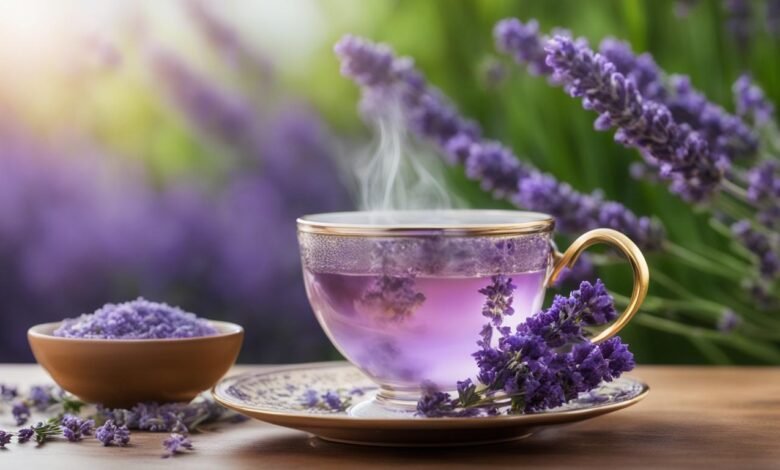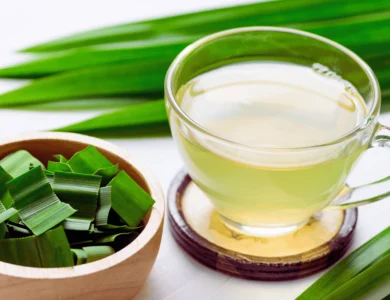
Lavender tea is a popular herbal tea that offers numerous benefits for relaxation and overall well-being. Made by brewing the purple buds of the Lavandula angustifolia plant with hot water, lavender tea is not only delicious but also provides a range of potential health benefits.
One of the main advantages of lavender tea is its potential to promote anxiety relief and stress reduction. Lavender has long been used for its calming effects, and drinking lavender tea may help alleviate feelings of tension and promote a sense of relaxation. This makes it an excellent choice for individuals seeking natural remedies for anxiety relief and stress management.
Moreover, lavender tea has also been associated with improved sleep quality. While specific studies on lavender tea’s effect on sleep are limited, research on other forms of lavender, such as fragrance and oil, has shown promising results. Enjoying a cup of lavender tea before bed, especially appreciating its soothing scent, may help promote better sleep and create a peaceful bedtime routine.
In addition to its potential benefits for anxiety and sleep, lavender tea may also have positive effects on mood disorders. The compounds in lavender can stimulate certain areas of the brain, resulting in improved mood and a calming effect. Research on lavender aromatherapy and oil preparations has shown positive outcomes in terms of calming nerves and decreasing symptoms of anxiety and depression. While more research is needed to understand the specific benefits of lavender tea for mood disorders, initial studies have shown promising potential.
Furthermore, lavender tea may also provide relief from menstrual cramping. While research specifically on lavender tea’s effect on menstruation is lacking, the use of lavender in other forms, such as smelling lavender for 30 minutes per day, has been shown to reduce pain associated with menstrual cramps. This suggests that drinking lavender tea and appreciating its delightful aroma may also help alleviate discomfort during the menstrual cycle.
Lastly, lavender tea may have positive effects on skin health. Lavender oil contains anti-inflammatory and antibacterial properties, making it beneficial for various skin conditions. It has been used topically to fight acne, improve inflammatory skin conditions like psoriasis, and promote wound healing. While more research is needed to fully understand the effects of lavender tea on skin health, its potential benefits cannot be overlooked.
In conclusion, lavender tea offers a range of potential benefits for relaxation, anxiety relief, stress reduction, and overall well-being. Whether enjoyed for its calming effects, potential sleep benefits, mood-enhancing properties, relief from menstrual cramping, or skin health advantages, incorporating lavender tea into your daily routine may be a simple and enjoyable way to enhance your quality of life. Remember to consult with a healthcare professional before incorporating any new herbal teas into your routine, especially if you have any existing medical conditions or are taking medications.
Lavender Tea and Sleep
The calming effects of lavender are well-known, and it is often used as a natural sleep aid. While there are no specific studies on the effect of lavender tea on sleep quality, research on other forms of lavender, such as fragrance and oil, shows promising results.
One study conducted on new mothers found that those who smelled and drank lavender tea reported an improvement in sleep quality. Additionally, proper sleep hygiene and breathing in the soothing aroma of lavender have shown to enhance sleep quality in college students with sleep issues.
Although further research is needed to fully understand the impact of lavender tea on sleep, enjoying a cup of lavender tea before bedtime, especially while appreciating its delightful scent, could potentially promote better sleep.
The Potential Benefits of Lavender Tea for Sleep:
- Possibly improving sleep quality
- Aiding in relaxation
- Reducing restlessness before bed
For those seeking a natural sleep aid, lavender tea could be a soothing and enjoyable option to incorporate into their bedtime routine. Taking a moment to unwind with a cup of lavender tea may have a calming effect on the mind and body, promoting a restful night’s sleep.
Lavender Tea and Mood Disorders
Lavender is a widely recognized natural remedy for anxiety, depression, and fatigue. Its soothing aroma and unique compounds have been shown to have a calming effect on the mind and body, making it an excellent choice for those seeking relief from mood disorders.
Research on lavender aromatherapy and oil preparations has consistently demonstrated positive effects on calming nerves, decreasing anxiety, and alleviating symptoms of depression. These studies show that lavender can stimulate certain areas of the brain and influence the transmission of impulses, thereby improving mood and reducing stress levels.
While lavender tea may offer similar benefits, further research is still needed to confirm its effectiveness in treating mood disorders. However, a study conducted on new mothers found that those who regularly consumed lavender tea reported lower levels of fatigue and depression compared to those who did not.
The Calming Effects of Lavender
The calming effects of lavender have been attributed to its ability to interact with the brain’s neurotransmitters, promoting relaxation and reducing anxiety. Lavender tea, just like other forms of lavender, contains these beneficial compounds, making it a potential natural remedy for anxiety relief and stress reduction.
Drinking lavender tea may bring a sense of tranquility and peace, helping individuals unwind after a long and stressful day. The gentle aroma and delicate taste of lavender tea can create a soothing experience, allowing individuals to relax both physically and mentally.
The Potential of Lavender Tea for Mood Disorders
Although lavender tea has shown promising results in reducing fatigue and depression in some studies, more research is needed to fully understand its long-term benefits for mood disorders. It is important to note that the effectiveness of lavender tea may vary from person to person, and it should not replace professional medical advice or treatment.
Individuals seeking relief from mood disorders should consult with a healthcare professional to explore the most suitable treatment options. Lavender tea can be enjoyed as part of a holistic approach to managing mood disorders, complementing other therapies and self-care practices.
While lavender tea may offer potential benefits for mood disorders, it is essential to remember that each individual’s experience may differ. As with any natural remedy, it is wise to start with small amounts and monitor your body’s response to determine the best approach for your specific needs.
In summary, lavender tea is a popular choice among individuals seeking natural remedies for anxiety relief, stress reduction, and mood disorders. While more research is needed to confirm its effectiveness, its calming effects and potential benefits make it a soothing and enjoyable beverage for those looking to enhance their well-being.
Lavender Tea and Menstrual Cramping
Lavender is known for its calming properties, but did you know that it may also help alleviate menstrual cramps and discomfort? Research has shown that smelling lavender for 30 minutes per day during the first 3 days of the menstrual cycle can reduce painful cramping. While there are no specific studies on lavender tea’s effect on menstrual cramping, it’s possible that drinking lavender tea and appreciating its soothing scent may provide some relief.
To fully understand the potential benefits of lavender tea in reducing menstrual cramping, further research is needed. However, incorporating lavender tea into your self-care routine during your period may offer a natural way to promote relaxation and ease discomfort.
Lavender Tea and Skin Health
Lavender tea, derived from the Lavandula angustifolia plant, offers numerous health benefits, including promoting skin health. With its anti-inflammatory and antibacterial properties, lavender oil has long been used topically to combat acne, improve inflammatory skin conditions like psoriasis, and aid in wound healing.
A study conducted on rats revealed that the topical application of lavender oil reduced the wound area and stimulated collagen production, indicating its potential for promoting skin healing and collagen formation. These findings suggest that incorporating lavender tea into your skincare routine may provide similar skin-enhancing effects.
While the use of lavender oil in skincare is well-documented, more research is needed to fully understand the specific effects of lavender tea on skin health. Nevertheless, its anti-inflammatory and antibacterial properties make it a promising addition to your beauty regimen, especially if you’re looking for a natural and gentle alternative.
As you explore the health benefits of floral teas, don’t overlook the potential of lavender in both aromatherapy and tea form. By incorporating lavender tea into your routine, you can embrace its calming effects while potentially promoting skin health. Remember to consult with your healthcare provider or dermatologist before making any significant changes to your skincare routine.




